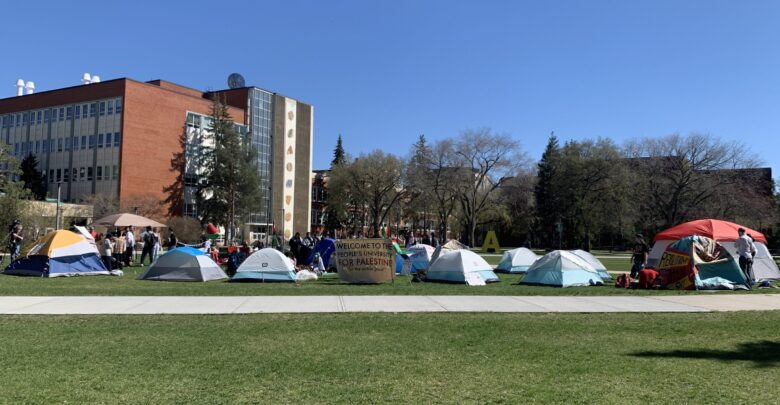U of A launches third party-review into encampment removal
In response to the third-party review, People's University for Palestine YEG held an event for people to share testimonials about their experience at the Palestine solidarity encampment.
 Dylana Twittey
Dylana TwitteyOn the early morning of May 11, a Palestine solidarity encampment was removed from the University of Alberta Main Quad by the Edmonton Police Service (EPS), at the university’s request. The encampment went up May 9, and campers included students, faculty, and community members. A third-party investigation into the encampment removal is now being led.
The encampment was forcefully taken down and officers deployed non-lethal munitions. Witnesses reported injuries. According to President and Vice-chancellor Bill Flanagan, “escalating actions put the university community’s safety at risk,” which prompted the university to ask EPS for assistance.
Following the encampment’s removal, protestors called for Flanagan’s resignation. Encampment participants addressed the university’s allegations of safety risks, and also called for Flanagan’s immediate resignation. On May 23, the Arts Faculty Council passed a motion of non-confidence in his leadership.
On May 22, the Association of Academic Staff of the University of Alberta (AASUA), the Graduate Students’ Association, the Non-Academic Staff Association, the Postdoctoral Fellows Association, and the U of A Students’ Union demanded a third-party investigation into the encampment removal. At the May 27 General Faculties Council (GFC) meeting, AASUA President Gordon Swaters put forward a motion recommending a third-party investigation. The motion passed.
On July 2, Board of Governors (BoG) Chair Kate Chisholm stated that BoG is proceeding with an independent third-party review.
BoG selected retired Court of King’s Bench of Alberta Justice Adèle Kent to lead the review. Kent graduated from the U of A with a Bachelor of Laws in 1977.
Anyone associated with the encampment’s removal is able to submit information or opinions to Kent by August 15. In an email sent to U of A community members on July 8, Kent said that she will view security camera footage from the Main Quad, review submissions, and interview administration and witnesses.
“All of that will help me create a framework for what additional steps I need to take before preparing my report,” she wrote.
People’s University for Palestine YEG responds to third-party review
On July 16, People’s University for Palestine YEG (PU4P) — the group that organized the encampment — issued a statement in response to the third-party investigation. PU4P rejected the review because “no interest was expressed in what kind of inquiry could take proper account of the harm done to us or be legitimate in our eyes,” the statement read.
The statement also lists parts of the review that PU4P finds “inadequate,” including that the review “excludes adequate consideration of actions of the EPS,” and that there is “no promise to make the university’s documentation [of the review] public or share information with encampment leaders or their legal representatives.”
At a BoG meeting on June 14, Chisholm said the review won’t look at EPS’ actions “because once the university calls the police in, we have no control over what they do.”
PU4P’s statement also said that the review is “narrowly focused on how the university planned for an encampment and what unfolded after the encampment was established on May 9. It does not place those decisions and actions in the context of months of anti-Palestinian decisions by the university.”
In response, PU4P organized an event on August 1 to hear testimonies from those who were present at the encampment and affected by the removal.
The Gateway requested comment from U of A media relations regarding PU4P’s statement and event, however did not get a response before the given deadline.
Academics give speeches, campers give testimonials
At P4UP’s testimonial event, the speakers list included Muna Saleh, an associate professor in the faculty of education at Concordia University of Edmonton; Chelsea Vowel, an assistant lecturer in the U of A faculty of Native studies; and Ghada Ageel, an assistant lecturer in the U of A department of political science.
Saleh said the removal of the encampment by EPS was “rooted in anti-Palestinian racism and Orientalist dehumanization” and is “symptomatic of the racist colonial violence that is literally built and continues to structure these institutions.” Saleh personally visited the encampment several times.
“[I] personally witnessed the power and beauty of the encampment that students, faculty, staff, alumni, and community members created.”
Vowel spoke about settler colonialism and made comparisons between Palestine and Canada. She emphasized the importance of having nuanced conversations about settler colonialism, white supremacy, anti-Blackness, and Orientalism.
“Until we tear down the system, until this university stops occupying Indigenous lands, talking about reconciliation, then we’re just forever at the mercy of settler colonial logics,” Vowel said.
Ageel said freedom of expression is a fundamental aspect of civic life and that “universities that turn their back and neglect this right become institutions of deafening silence.” The violence in Palestine should “move institutions … to uphold their moral responsibility and ethical duty to speak out against injustice.”
“And unfortunately, it has not.”
During the testimonials, speakers spoke of their experiences at the encampment before and during the removal, and the negative effect EPS’ actions on May 11 had on their mental health.




